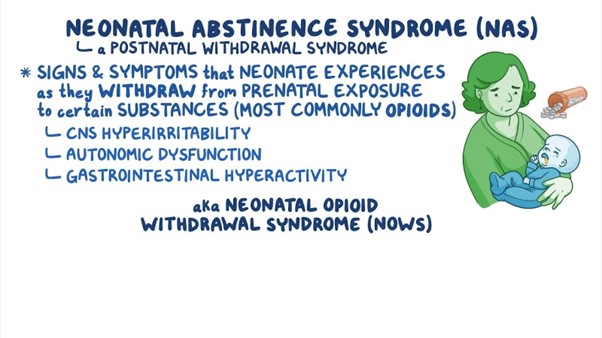A nurse is assessing a neonate who was exposed to heroin in utero. Which of me following findings should the nurse identify as an indication that the neonate is experiencing neonatal abstinence syndrome?
Hyporeflexia
Frequent yawning
Respiratory depression
Constipation
The Correct Answer is A
Neonatal abstinence syndrome (NAS) is a group of withdrawal symptoms that occur in newborns who were exposed to drugs, including heroin, in utero. Hyporeflexia, which refers to reduced or diminished reflexes, is one of the key findings in neonates experiencing NAS.
During pregnancy, when the mother uses opioids like heroin, the baby becomes dependent on the drug. After birth, when the drug is no longer available, the baby experiences withdrawal symptoms as the body adjusts to the absence of the drug. Hyporeflexia is a common manifestation of NAS and is observed due to the central nervous system's response to the withdrawal.
Let's go through the other options:
B. Frequent yawning: While yawning can be seen in neonates with NAS, it is not as specific to the condition as hyporeflexia. Yawning can occur for various reasons and may not always be indicative of NAS.
C. Respiratory depression: Respiratory depression can be a severe complication of opioid exposure in utero and can result in life-threatening situations for the neonate. However, it is not specific to NAS. Respiratory depression is more closely associated with opioid overdose in the newborn, which can be a separate concern from NAS.
D. Constipation: Constipation is a possible symptom in neonates experiencing NAS, but it is not as specific as hyporeflexia. Constipation can occur due to various factors and is not unique to NAS.

Nursing Test Bank
Naxlex Comprehensive Predictor Exams
Related Questions
Correct Answer is B
Explanation
When caring for a client receiving heparin by continuous IV infusion for the treatment of venous thrombosis, the nurse should monitor the client's aPTT (Activated Partial Thromboplastin Time) to titrate the heparin dose.
Heparin is an anticoagulant medication used to prevent and treat blood clots. The aPTT is a coagulation test that measures the time it takes for the blood to clot when a specific activator is added. Monitoring the aPTT is a standard method for assessing the anticoagulant effect of heparin and ensuring that the client's blood remains within the desired therapeutic range.
The therapeutic range for aPTT while on heparin therapy varies depending on the indication and the client's condition but is generally maintained at a level that prolongs the clotting time enough to prevent and treat thrombosis while avoiding excessive bleeding risk.
Let's go through the other options:
A. Platelet function assay: While monitoring platelet function is essential for assessing overall hemostasis and platelet function, it is not specifically used for titrating heparin doses. Platelet function assays are more commonly used to assess the function of platelets in the context of platelet disorders or antiplatelet medication therapy.
C. INR (International Normalized Ratio): The INR is used to monitor the effect of vitamin K antagonist anticoagulants, such as warfarin, and is not the appropriate test for monitoring heparin therapy.
D. Amylase: Amylase is an enzyme produced by the pancreas and salivary glands and is not relevant for monitoring heparin therapy. Elevated amylase levels are typically associated with pancreatitis and not related to heparin treatment.
Correct Answer is A
Explanation
When providing teaching to a client with chronic rheumatoid arthritis who is starting a new prescription for hydroxychloroquine, the nurse should instruct the client to obtain routine eye examinations. Hydroxychloroquine is an antimalarial and immunosuppressive medication commonly used to treat rheumatoid arthritis and other autoimmune conditions.
One of the potential side effects of hydroxychloroquine is ocular toxicity, particularly affecting the retina. Retinal toxicity can lead to vision changes or, in severe cases, irreversible damage to the eyes. Therefore, regular eye examinations are necessary to monitor for any signs of retinal toxicity and detect any visual changes early to prevent further complications.
The American Academy of Ophthalmology recommends that patients taking hydroxychloroquine undergo a baseline eye examination before starting the medication and annual eye examinations thereafter, especially after five years of continuous use.
Let's go through the other options:
B. Chest x-ray: A chest x-ray is not routinely required for monitoring clients taking hydroxychloroquine for rheumatoid arthritis. Hydroxychloroquine is not known to cause significant respiratory or pulmonary side effects.
C. Pancreatic enzyme levels: Monitoring pancreatic enzyme levels is not specifically related to hydroxychloroquine therapy. Pancreatic enzyme level testing is typically used to assess the function of the pancreas in conditions like pancreatitis or pancreatic insufficiency.
D. Urinalysis screening: While regular monitoring of kidney function is important for clients on long-term medication therapy, routine urinalysis screening is not specifically related to hydroxychloroquine use in clients with rheumatoid arthritis. Regular eye examinations are of higher priority due to the potential ocular toxicity associated with this medication.
Whether you are a student looking to ace your exams or a practicing nurse seeking to enhance your expertise , our nursing education contents will empower you with the confidence and competence to make a difference in the lives of patients and become a respected leader in the healthcare field.
Visit Naxlex, invest in your future and unlock endless possibilities with our unparalleled nursing education contents today
Report Wrong Answer on the Current Question
Do you disagree with the answer? If yes, what is your expected answer? Explain.
Kindly be descriptive with the issue you are facing.
